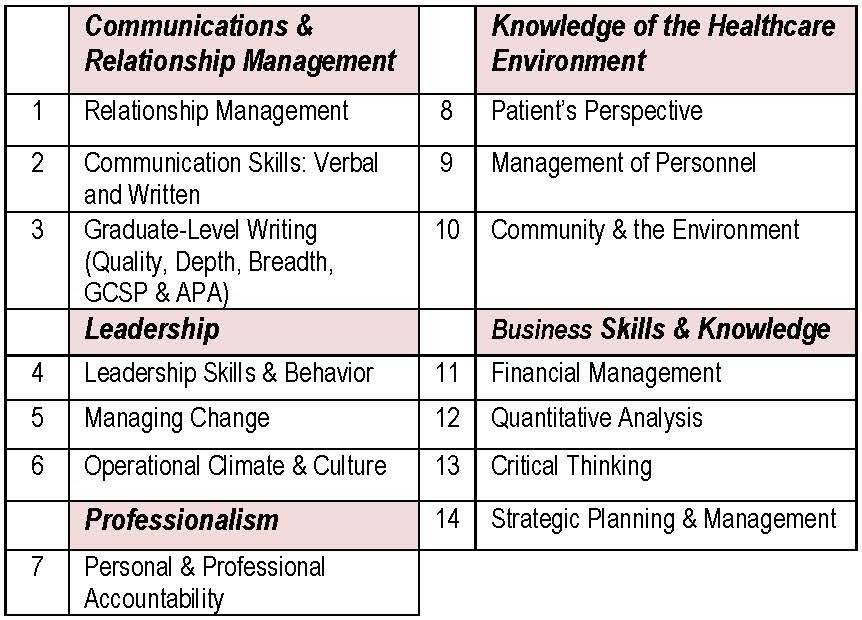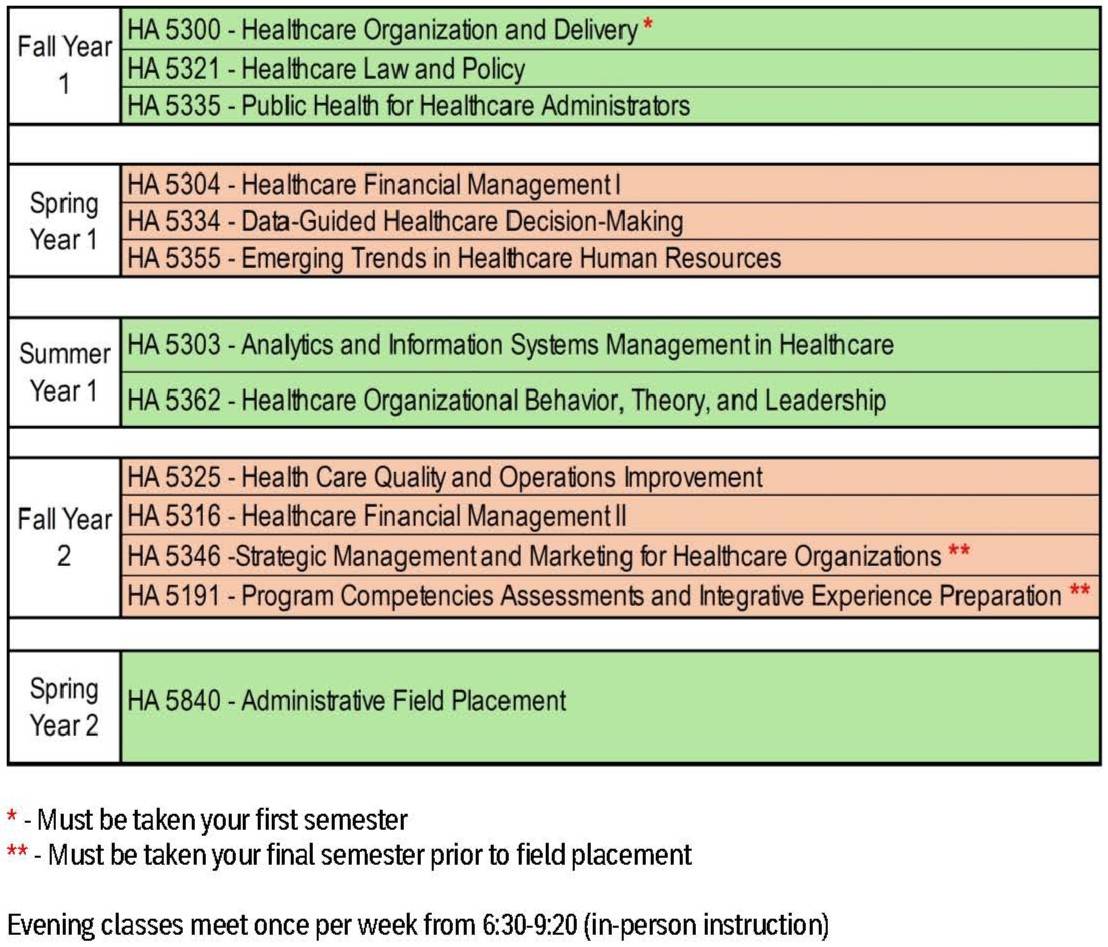Master of Healthcare Administration (MHA)
Mission, Vision, & Values
Mission
The mission of the MHA program is to prepare early-careerists to mid-level healthcare administrators for careers in a variety of healthcare settings.
Vision
The vision for the MHA program at Texas State University is to be the graduate health administration program of choice for students, faculty, alumni, and employers in the United States.
Values
We value and, teach, model leadership, service, scholarship, professionalism, and lifelong learning.
Structure, Pace, Content
Structure: 100% Face-to-Face
Synchronous in-person instruction
Requirements to Apply:
Domestic
- Baccalaureate degree from a regionally accredited university
- Copy of an official transcript from each institution where course credit was granted
- a 2.75 overall GPA or a 2.75 GPA in your last 60 hours of undergraduate course work (plus any completed graduate courses)
- 3 letters of recommendation
- Statement of purpose
- Resume
- GRE not required
International
- Official TOEFL iBT scores required with a 85 overall
- Official PTE scores required with a 57 overall
- Official IELTS (academic) scores required with a 6.5 overall and minimum individual module scores of 6.0
- Official DET (Duolingo English Test) scores required with a 115 overall
- Official TOEFL Essentials scores with a 9.5 overall
We also offer the fully online asynchronous Executive MHA concentration HERE
Competencies
The Master of Healthcare Administration (MHA) program addresses the following course competencies throughout the curriculum:

Rankings
Best Faculty and 5th ranked MHA program overall in 2023 (intelligent.com)
CAHME Accredited

Program Pace


For More Information Contact
Dr. Zo Ramamonjiarivelo
Associate Professor & MHA Program Coordinator
School of Health Administration
Encino Hall, 256
E-mail: zhr3@txstate.edu (preferred)
Office Phone: 512.245.3497
Office Fax: 512.245.8712
Courses
Visit the M.H.A catalog page for detailed course listings and descriptions.
Course Details
HA 5111. Topics in Health Administration. (1-0) This course includes an in-depth study of a singular topic, or a related problem being encountered by practicing managers in the rapidly changing healthcare industry. Special emphasis is placed on the topic’s current relevance and its utilitarian value. This course may be repeated for credit with a different topic area.
HA 5191. Program Competencies Assessments and Integrative Experience Preparation. (1-0) This course prepares students for the end-of-program, final integrative comprehensive exam to assess students’ program competencies. Students complete the final integrative comprehensive exam and prepare for an effective transition from the classroom setting to the contemporary healthcare organization work environment.
HA 5300. Healthcare Organization and Delivery. (3-0) This course includes an overview and comparison of the organization and delivery of health services focusing on the history, development, and current delivery by organizations in the continuum of care. Through the course, students acquire foundational knowledge and management applications pertaining to governance, policy, organizational structures, stakeholders, research, and patient-centered care.
HA 5301. Healthcare Administration Research Methods. (3-0) A study of research methodology as it pertains to healthcare administration. Included are hypothesis forming, designing research, and the collection, manipulation and analysis of data. Knowledge of numeracy and statistics is essential.
HA 5303. Healthcare Analytics and Information System Management. (3-0) This course provides a comprehensive introduction to information systems management for healthcare organizations, with a focus on incorporating analytics for informed decision-making. It covers the determination of information required by whom, design of information flows, procurement of information systems technology resources, assurance of information security, and management of systems integration. Students gain skills in leveraging analytics for insights and trend analysis, optimizing technology solutions, and addressing the unique challenges of healthcare data management.
HA 5304. Healthcare Financial Management I. (3-0) This course introduces selected financial management concepts and practices in healthcare organizations. It is a broad introduction to important financial theories, tools, issues, and terminology. Throughout the course, students apply financial management concepts in practical assignments related to health insurance and reimbursement methods, basic managerial accounting, interpretation of healthcare financial statements, cost and profit analysis, departmental and service-line costing and pricing, and planning and budgeting.
HA 5311. Trends in Healthcare Administration. (3-0) This course offers students an in-depth study of a singular trend or related problem experienced by practicing managers in the rapidly changing healthcare industry. Special emphasis is placed on the selected topic’s current relevance and its utilitarian value. Examples of trends can include processes or problems occurring in a specific delivery setting; ethical issues; emerging policy, regulation, or law implications; supply chain; and total quality management. This course may be repeated for credit with a different subject area.
HA 5316. Healthcare Financial Management II. (3-0) This course builds on the concepts covered in Financial Management I and emphasizes development and application of analytical, statistical, and mathematical competencies pertaining to time value analysis, risk and return concepts, debt and equity financing, cost of capital, capital budgeting, project risk analysis, lease financing and working capital management.
HA 5321. Healthcare Law and Policy. (3-0) This course addresses legal issues pertaining to health services as they relate to providers and consumers within the healthcare system. It covers the legal issues surrounding the relationship of patients, providers, and healthcare institutions and examines managerial and clinical ethics as they relate to the provision of health services. The course also addresses policy issues at state and national levels, including how to analyze policies and facilitate policy development, from the perspective of various stakeholders. Students evaluate changing healthcare policy paradigms and decision points.
HA 5325. Healthcare Quality and Operations Improvement. (3-0) This course instructs the concepts of quality management in health care integrating quality improvement tools using continuous process improvement methodologies. Students learn to translate healthcare quality management theory, concepts, and knowledge into practice by applying statistical methods and analysis to eliminate defects, reduce waste, and deliver excellent patient/client experiences. Students gain familiarity with the quality standards required by federal and private organizations.
HA 5334. Data-Guided Healthcare Decision-Making. (3-0) This course provides the foundation of quantitative reasoning with data evidence and emphasizes the critical nature of the group decision-making process. The course defines the scope and limitations of decision-making. The role of uncertainties in decision-making are illustrated with examples from health care. The adverse outcomes and their consequences in healthcare decisions are explored. The concepts and tools of decision-making trees are applied to improve the quality of decisions. Students practice identifying and rectifying root causes to mitigate risks of adverse outcomes.
HA 5335. Public Health for Healthcare Administrators. (3-0) This course includes an examination of the ten essential services of public health and the role of the healthcare manager in disease prevention and improvement of the community’s health, as well as public health surveillance. Students apply the core public health functions as a framework to contextualize public health issues. Students gain experience and practice identifying sources of data and examining peer-reviewed literature.
HA 5346. Strategic Management and Marketing for Healthcare Organizations. (3-0) This capstone course builds upon analytical skills needed for making evidence-based strategic and marketing decisions. It covers the strategic planning/management process in the competitive healthcare industry including the assessment of both the external and internal environments and alignment of an organization’s strengths and weaknesses with external threats and opportunities. The study of marketing functions, principles, and concepts as they relate to the healthcare delivery system is also included. Students develop skills by analyzing a real healthcare organization and recommending strategic and marketing decisions.
HA 5355. Emerging Trends in Healthcare Human Resources. (3-0) This course identifies, analyzes, and suggests strategies for managing emerging human resource trends with a focus on the healthcare industry. Course emphasis includes responding to and providing leadership in the key human resource functions of employment, compensation, benefits, employee relations, leadership and staff development, and succession planning.
HA 5356. Policy Development in Healthcare Arena. (3-0) Prospective healthcare administrators analyze changing healthcare paradigm to determine decision-points where policies can be affected. Course allows students to apply existing skills to real world policy issues at state and national levels and to analyze policy development from numerous stakeholders’ viewpoints.
HA 5362. Healthcare Organizational Behavior, Theory, and Leadership. (3-0) This course provides a foundation and conceptual framework for understanding and navigating healthcare organizational behavior, grounded in the study of organizational, management, leadership, motivation, teaming, and cultural theories, drawing from the behavioral and social sciences. Students learn and practice applied skills in communication, motivation, leadership, teaming, collaboration, facilitation, negotiation, decision-making, change and conflict management through an experiential-learning project.
HA 5371. Marketing of Health Services. (3-0) A study of marketing functions and principles as they relate to the healthcare delivery system. Analysis of marketing concepts such as market segmentation, marketing planning, marketing audit, marketing positioning, and marketing mix will be discussed.
HA 5375. Healthcare Accounting. (3-0) An introduction to financial accounting in healthcare with an emphasis on the preparation of non-profit financial statements for healthcare service organizations, control procedures for healthcare entities, and accounting issues unique to the healthcare industry. This course does not earn graduate degree credit.
---------------------------------------------------------------------
Final term:
HA 5840. Administrative Field Placement. (8-0) A one-semester, full-time field experience which allows students to apply their foundational didactic education by means of rotations, experiences, and projects in a healthcare organization.
OR
HA 5399A. Thesis. (3-0) This course represents students’ initial thesis enrollment. No thesis credit is awarded until students have completed the thesis in Health Administration 5399B. Graded on a credit (CR), progress (PR), no-credit (F) basis.
HA 5399B. Thesis. (3-0) This course represents students’ continuing thesis enrollments. Students continue to enroll in this course until the thesis is submitted for binding. Graded on a credit (CR), progress (PR), no-credit (F) basis.


